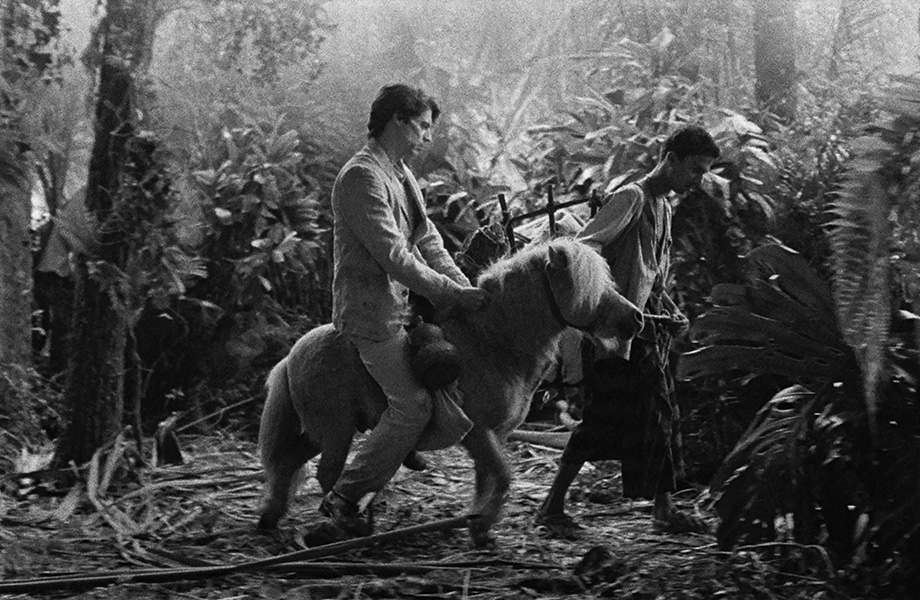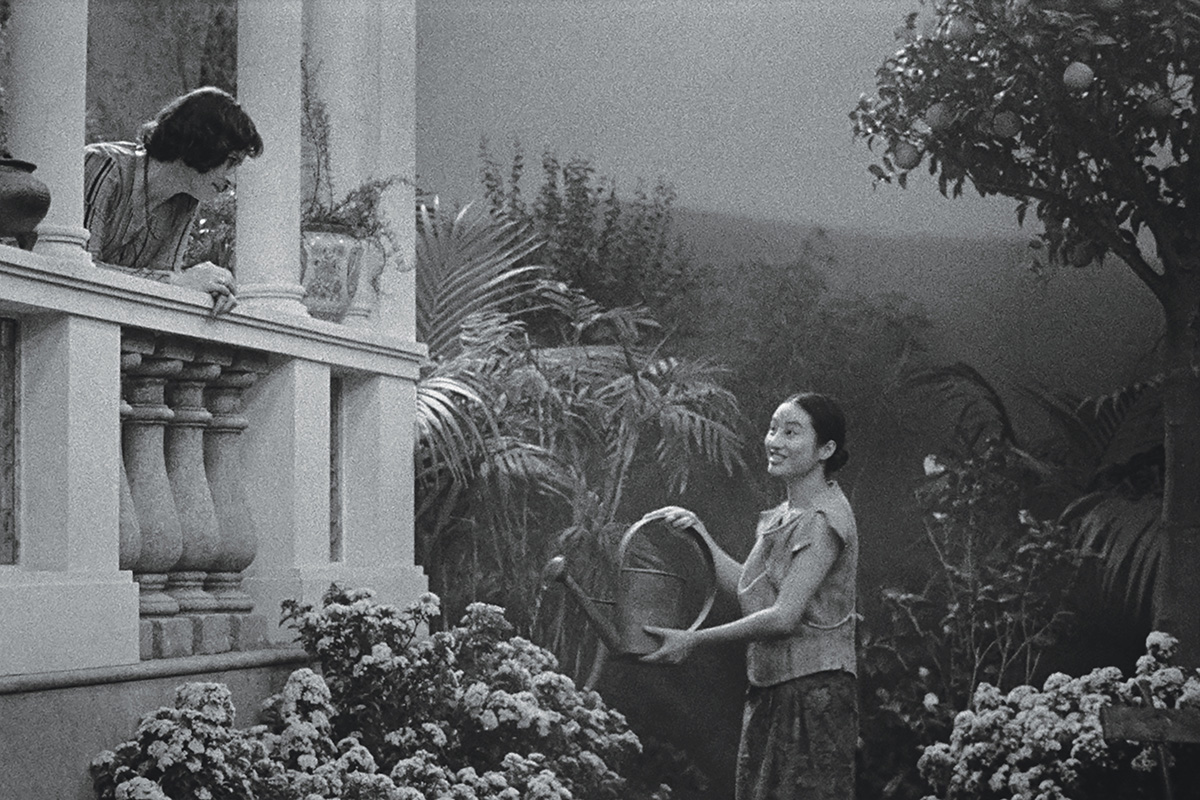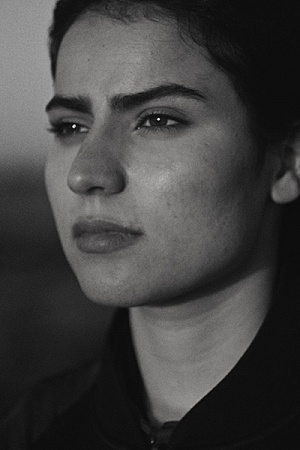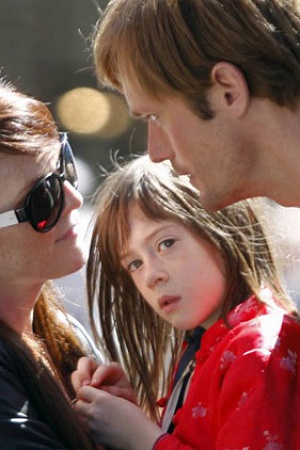Grand Tour

In the weeks since David Lynch’s death, much of the conversation around his legacy has focused on the dream-like quality of his work, a quality ephemeral enough that long ago it necessitated the coining of its own eponymous adjective: ‘Lynchian’. But without the ease of such brand-name recognition, how might we define what makes a film ‘dream-like’? Is it the absence of hard logic and traditional storytelling beats? Is it a sense of the uncanny coupled with a knack for visual surrealism? These things are all present in Lynch’s work, as they are in the work of Portuguese filmmaker Miguel Gomes, but it would do both artists a disservice to reduce the cumulative effect of their films down to such a straightforward checklist. After all, dreams can rarely be parsed so literally; they rely on unexpected confluence and the new meanings that emerge when two or more previously unassociated things – sound and image, place and person, history and fiction – are suddenly juxtaposed.
Grand Tour, the lavishly experimental historical drama that won Gomes Best Director at Cannes in 2024, is a singular act of such dream-like juxtaposition, possessed with a kind of internal logic it feels little obligation to share with the viewer (dreamer). It begins with Edward (Gonçalo Waddington), a linen-suited, po-faced British civil servant stationed in colonial Burma (Myanmar) in 1918. On the day he is due to meet and marry his fiancée of seven years, Molly (Crista Alfaiate), he suffers a disastrous bout of cold feet and boards the first boat to Singapore without so much as packing a suitcase, abandoning sweet Molly all but one step from the altar. Thus begins Edward’s inadvertent, improvised, and increasingly melancholic ‘grand tour’ through East and South-East Asia, from Singapore to Bangkok to Saigon to Manila to Osaka to Shanghai and then up the Yangtze River into the dense bamboo forests of inland China. In true picaresque fashion he encounters all kinds of colourful characters along the way: Molly’s louche barfly cousin Reginald (Jorge Andrade), the adolescent Prince of Siam (Rembrandt Beerens), a group of roaming Komusō monks, and an opium-loving British envoy named Horace Seagrave (João Pedro Bénard), who smokes ‘eight pipes a day’ while reflecting on the imminent ‘end of the Empire’.
 Crista Alfaiate as Molly and Lang Khê Tran as Ngoc in Grand Tour (courtesy of Potential Films).
Crista Alfaiate as Molly and Lang Khê Tran as Ngoc in Grand Tour (courtesy of Potential Films).
All the while, Edward is haunted – stalked, even – by unnervingly upbeat telegrams from Molly who, it would appear, is in hot pursuit. Grand Tour’s best storytelling decision is to bifurcate its narrative, switching halfway through and picking up Molly’s adventures from the moment she realises that she has been left at the port in Rangoon (Yangon) and decides to retrace Edward’s footsteps, doggedly pursuing her wayward beau across the continent. This switch-up gives Grand Tour a much-needed shot in the arm, mostly thanks to Alfaiate’s light and winning energy. As opposed to Edward – prone to bouts of feverish melancholy, mostly described in cryptic voice-over – Molly seems willing to engage with the people and cultures she encounters on their own terms (to begin with, at least). Her half of the story is all the more engaging for it.
Through his dual protagonists, Gomes shows us two different ways of interacting with the world: one as a naïve and open-hearted traveller, the other as a disillusioned coloniser touring the afterglow of their once-mighty conquest. Most of the people Edward encounters assume he must be travelling with some sort of political agenda, as a diplomatic functionary or even as a Crown spy. But Edward’s moral cowardice has reduced him from colonist to tourist, and Gomes’s film is designed to reflect this transition away from possession and towards observation. He attempts to strip the colonial lens from his camera in two ways: first, the narrative sections of Grand Tour are shot as homages to early black-and-white studio movies, filmed on soundstages with plastic jungle foliage or in rowdy, smoke-filled hotel restaurants. The performances are heightened, almost melodramatic, and Gomes playfully uses old-timey iris transitions and accompanies the action with jangling piano-hall music, making a parody of the bluster and frivolity of this era of colonial fantasy. Secondly, and contrastingly, his frequent digressions away from the narrative into modern-day, postcolonial versions of these countries are filmed as documentary: we see ferris wheels, fish markets, puppet shows, New Year’s Eve fireworks, lengthy bouts of karaoke, pandas in trees and macaques in the snow, all captured as plainly and objectively as possible. While Grand Tour’s first mode knowingly and pointedly exoticises, the other observes with zero interference – as any conscious modern traveller should.
While filmed in rich and grainy 16mm, Grand Tour’s various elements are otherwise wildly discordant: black and white switches to colour and back again; each section of the story is narrated in the native language of the country the characters are visiting; Portuguese actors play British, Japanese, and Vietnamese characters, variously speaking Portuguese and French. But these stylistic seams are Gomes’s point: rather than painting over the joins, he is drawing our attention to the overlap of memory and history, Siam and Thailand, Rangoon and Yangon, and so on. Culture and language persist under different names and different flags, even without a foreign power (or filmmaker) present to observe them.
Much like a dream, Grand Tour works better as an impressionistic thought experiment than as a fully rounded narrative. While evocative in their own right, Gomes’s lengthy detours into present-day Singapore, Manila, Osaka et al. contribute to the film’s treacherously languid pace, and at times feel like a distraction from Edward and Molly – a central storyline pointed and compelling enough as is without the need for quite so much thematic cushioning. Also like a dream, the film avoids tidy conclusions or reunions. Its power lies in suggestion rather than prescription. But if Grand Tour does suggest a thesis, it’s this: look but don’t touch; learn from observing rather than interfering. As they lie in the bamboo forests of Wangyu, Seagrave laments to Edward that Britain, and Western powers in general, are soon to wake up from the great dream of colonial rule, but that they are doomed to ‘leave without having understood a thing’.
Grand Tour (Potential Films) is in cinemas nationally from 13 February 2025.











Leave a comment
If you are an ABR subscriber, you will need to sign in to post a comment.
If you have forgotten your sign in details, or if you receive an error message when trying to submit your comment, please email your comment (and the name of the article to which it relates) to ABR Comments. We will review your comment and, subject to approval, we will post it under your name.
Please note that all comments must be approved by ABR and comply with our Terms & Conditions.